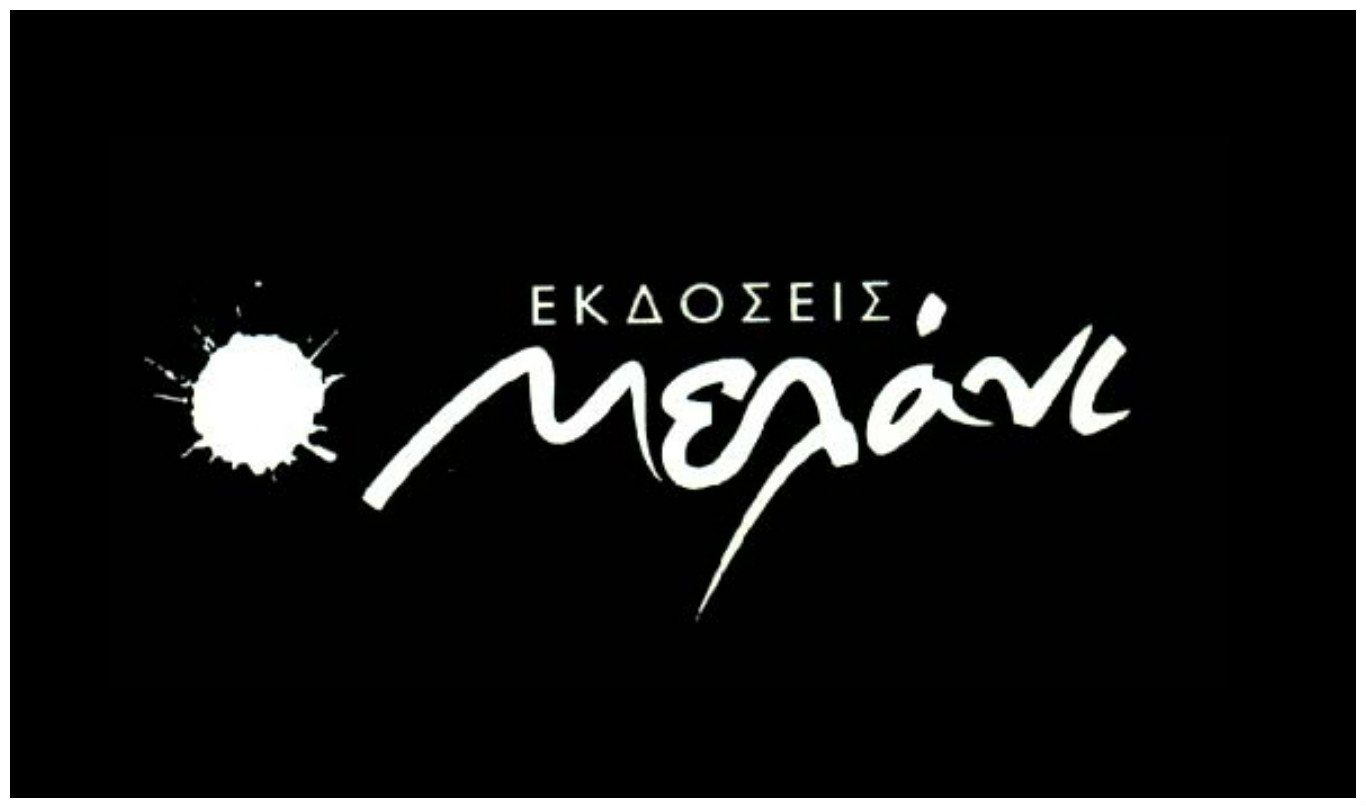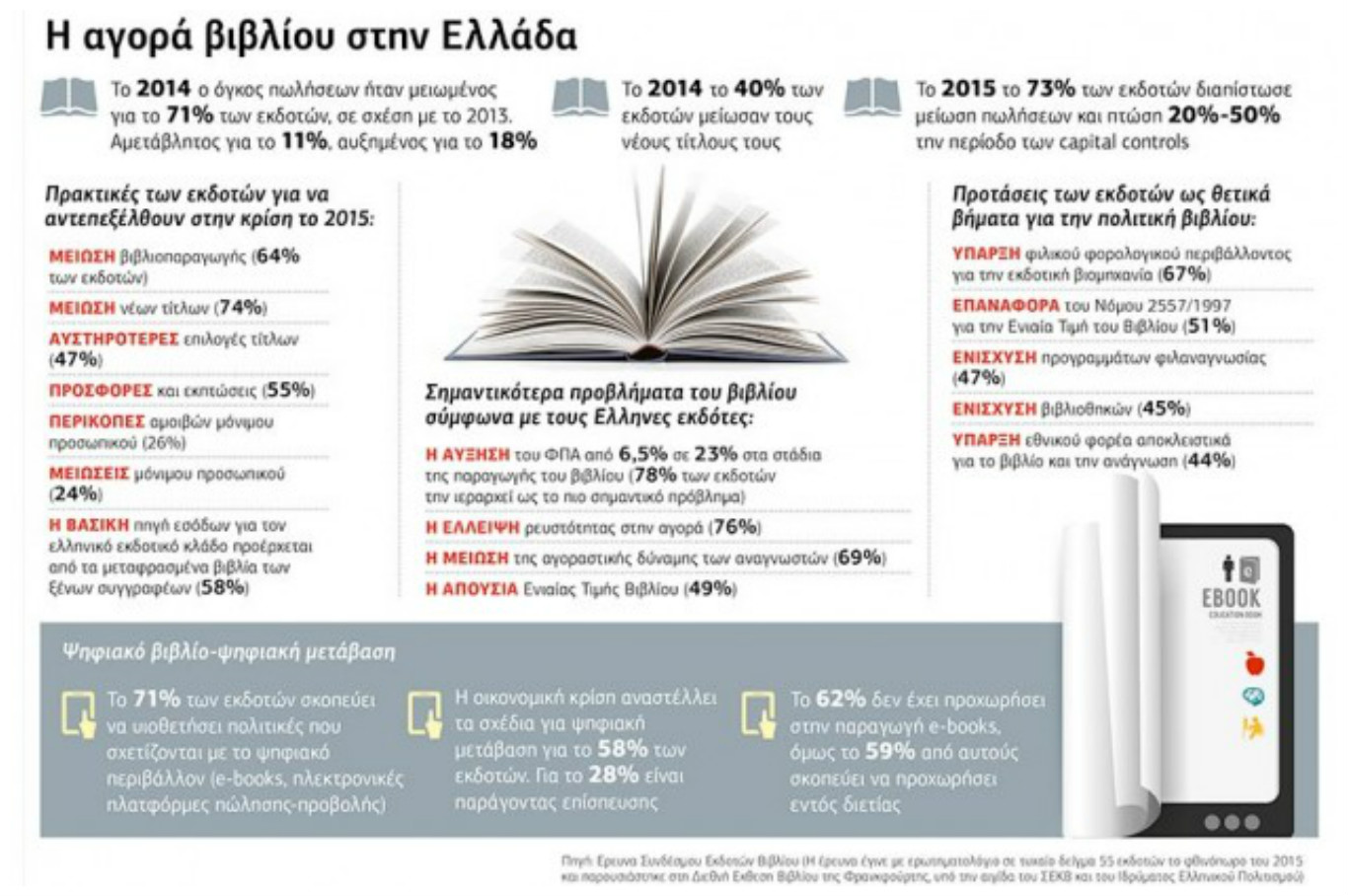Popi Gana started her career as an editor and book cover designer. In 2012 she founded Εκδόσεις Μελάνι [Melani Publications] renowned for the elegance and high quality of its publications. Since then, Melani Publications has published more than 360 titles including poetry and prose, both Greek and foreign, philosophy, sociology, biographies and children’s books.
Popi Gana spoke to Reading Greece* about her decision to start Melani Publications, noting that “the publisher’s role is that of a mediator that connects authors with their readers, while also offering new novelists and poets the chance to be heard and receive the recognition they deserve”. Asked about contemporary Greek literature and its prospects abroad, she comments that “the problem lies not so much in the quality of our literature as in the difficulty of the language, and the likelihood of finding sufficient and skillful translators – not to mention some tendency by foreign publishers to be on the lookout for folklore and the ‘exotic’”.
She also discusses the effects of the ongoing economic crisis on the Greek book market, publishers as well as reading preferences, noting that “the greatest threat is for only a few publishers to survive, who will, more or less, have similar things to propose”. She talks about “the lack of a coordinated and target-oriented state book policy”, concluding that “a more substantial role to be undertaken by the state, besides opening and equipping libraries, should be in the field of education, in the creation of new readers, who, in turn, will support bookstores and publishing houses”.

Having been an editor and a book cover designer for 15 years, how did you decide to cross over into publishing? Tell us a few things about Melani Publications, your publishing venture.
I have indeed worked as an editor and book cover designer for many years. Both these multilayered roles offered me the chance to delve into the book production process. I regard them as years of apprenticeship. I have always loved books and the more I worked in the field, the more intense my desire became to have a decisive role in more areas, to choose the titles myself and support the books I liked. So, Melani Publications came as the natural next step.
I started in 2012, with a book by former Foreign Affairs Minister Michalis Papakonstantinou, Βαλκάνια, η άγνωστη γειτονιά μας [Balkans, our unknown neighborhood]. Since then Melani Publications has published over 360 books, including poetry and prose, both Greek and foreign, philosophy, sociology, biographies, children’s books, all chosen one by one. I strive to always have a suggestion at hand, an invitation to readers for a new discovery that will add to their lives.
Melani Publications has a reputation for the elegance of its publications as well as for promoting new poets and novelists. Do you feel vindicated by your choices?

I’m glad that you mentioned the elegance of our publications. From the very start, I was of the opinion that aesthetics play a major part, as book covers are conducive to readership while they also offer enjoyment to readers, who develop a special relationship with the book-object. Yet, my main concern has always been the content. The publisher’s role is that of a mediator that connects authors with their readers, while also offering new novelists and poets the chance to be heard and receive the recognition I believe they deserve. I get immense satisfaction every time one of my new writers is shortlisted or is awarded a prize, which means I’ve done my job well.
What about contemporary Greek literature? Does the new generation of Greek writers have the potential to attract readers both in Greece and abroad?
Contemporary Greek literature, whether prose or poetry, has many and varied talents to display, and it certainly appeals to the Greek reading public. Besides, apart from major foreign titles, Greek literature records higher sales in our country. As for abroad, the problem lies not so much in the quality of our literature as in the difficulty of the language, and the likelihood of finding sufficient and skillful translators – not to mention some tendency by foreign publishers to be on the lookout for folklore and the ‘exotic’.
In the 14 years of its operation, Melani Publications has published more than 360 titles. How has the crisis affected the Greek book market and publishing houses in this respect? Has there been a shift in reading preferences due to the crisis?
The ongoing economic crisis has affected the Greek book market and publishers in multiple ways. In recent years we have witnessed the closure of many bookstores, which in turn means fewer retail outlets for publishers, as well as uncollected debts in many cases, which are unlikely to be ever paid back, creating black holes in our budget. Our margin of choice is becoming narrower, as we all strive for titles that would guarantee high sales. Diversity and pluralism are affected the most, given that reduced earnings make it much more difficult to go for more challenging or experimental choices.

The same goes for readers, who have become more hesitant in trying new things and choose more carefully how they spend their money; it takes a lot of effort to convince them that a book is worth buying. There is, however, a shift in reading preferences. In an effort perhaps to understand and interpret the crisis, there are many readers who opt for books on Modern Greek history either as disciplinary study or as a basis for fiction.
Yannis Baskozos has characterized the period 2009-2014 as the five lost years for books since the crisis that hit the book sector has been complex and multifaceted. Yet, what are the prospects ahead for books? Could digital books offer a way out?
Those five years have indeed been very difficult. However, we are still in the midst of the crisis and the book sector continues facing difficulties. I don’t believe that books will ever become extinct; they have survived through economic crises, wars, disasters. Not everybody will manage to get through and our greatest concern is to maintain enough variety on the market. The greatest threat is for only a few publishers to survive, who will, more or less, have similar things to propose. Those who persist are still enough and I sincerely hope that we will go on without further losses. As for digital books, they are undeniably a good alternative on account of their lower cost, but the digital book market share in Greece is too small so as to make the difference, at least for now.

It has been argued that what the Greek book market lacks is a concrete and purposeful state book policy. What should be done at a governmental policy level for the promotion of Greek books?
The lack of a coordinated and target-oriented state book policy has always been a problem in our country. There have been initiatives in the right direction from time to time, which were however always disrupted by change of leadership, government etc. The recent abolition of the single price system for books was a detrimental decision and a case of government policy to be avoided. A more substantial role to be undertaken by the state, besides opening and equipping libraries, should be in the field of education, in the creation of new readers, who, in turn, will support bookstores and publishing houses.
*Interview by Athina Rossoglou
TAGS: LITERATURE & BOOKS | READING GREECE














